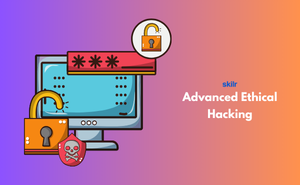👇 CELEBRATE CLOUD SECURITY DAY 👇
00
HOURS
00
MINUTES
00
SECONDS

Advanced Ethical Hacking involves legally testing computer systems and networks to uncover security gaps that hackers might exploit. By using specialized techniques and tools, ethical hackers can analyze vulnerabilities, simulate attacks, and recommend effective security measures to protect sensitive information. The focus is on improving system security rather than causing harm.
Through this certification, learners gain practical experience in sophisticated hacking methods, penetration testing, and system auditing. They acquire the expertise to identify risks, propose solutions, and implement strategies that strengthen organizational cybersecurity, opening pathways to high-demand IT security roles.
This exam is ideal for:
Domain 1 - Introduction to Advanced Ethical Hacking
Domain 2 - Advanced Network Hacking
Domain 3 - Web Application Hacking
Domain 4 - System and OS Exploitation
Domain 5 - Wireless Network Hacking
Domain 6 - Advanced Tools and Frameworks
Domain 7 - Malware and Threat Analysis
Domain 8 - Reporting and Countermeasures
Industry-endorsed certificates to strengthen your career profile.
Start learning immediately with digital materials, no delays.
Practice until you’re fully confident, at no additional charge.
Study anytime, anywhere, on laptop, tablet, or smartphone.
Courses and practice exams developed by qualified professionals.
Support available round the clock whenever you need help.
Easy-to-follow content with practice exams and assessments.
Join a global community of professionals advancing their skills.
Yes, the course covers sophisticated testing techniques for networks, systems, and applications.
Yes, including Wi-Fi security and man-in-the-middle attacks.
Yes, including ransomware, trojans, and other malware threats.
Absolutely, the focus is on legal, authorized testing to improve security.
Yes, including SQL injection, XSS, and CSRF vulnerabilities.
Yes, it strengthens practical skills required for cybersecurity certifications.
Yes, basic knowledge of networking, operating systems, and cybersecurity concepts is recommended.
Yes, it prepares candidates for penetration tester, security analyst, or ethical hacker roles.
Yes, including scanning, sniffing, and exploiting network services.
Yes, for risk assessment, auditing, and implementing defensive strategies.
Penetration tester, cybersecurity consultant, security analyst, ethical hacker, or IT auditor.
Yes, practical labs and simulations are part of the program.
IT security professionals, ethical hackers, network administrators, and cybersecurity enthusiasts.
Yes, ethical and legal standards in hacking are emphasized.
Yes, both Windows and Linux systems are addressed.